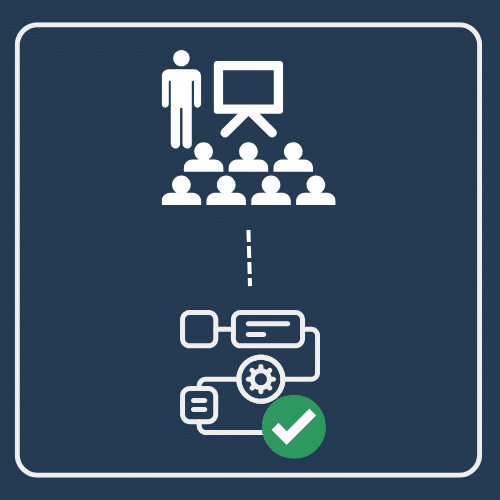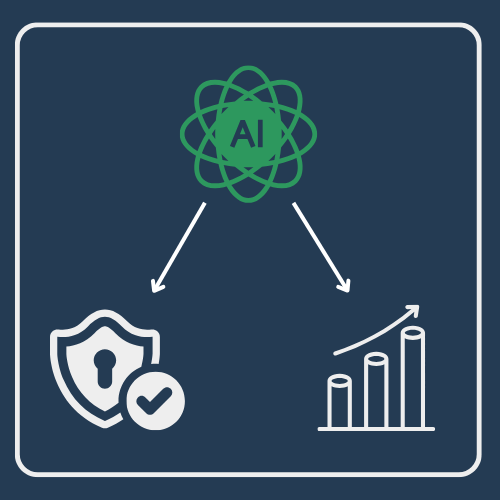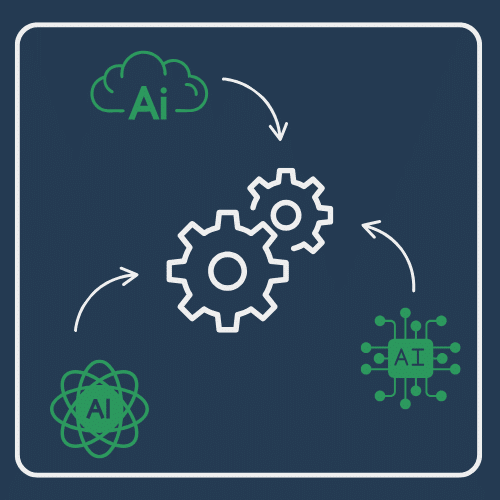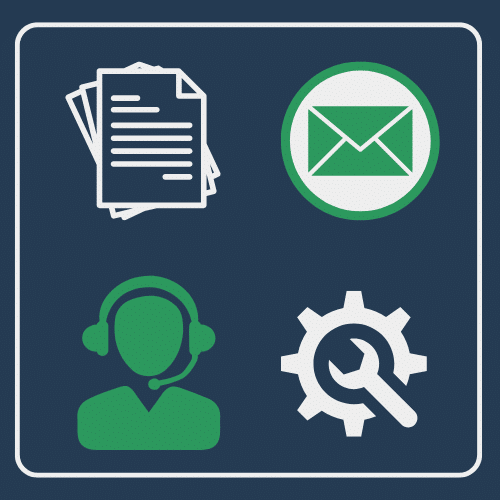SAP Business AI: Everything you need to know about this solution
Discover our guide to SAP Business AI, the solution that combines SAP and artificial intelligence to serve your business.
You are here : Home " SAP Guide " SAP Solutions »SAP Business AI
SAP Business AI is SAP's embedded artificial intelligence portfolio, designed to enrich all business processes (finance, logistics, purchasing, HR...) with advanced predictive, generative and intelligent automation AI capabilities. This solution is designed to optimize operational performance and support the digital transformation of companies.
Based on the SAP Business Technology Platform (BTP), SAP Business AI integrates natively with existing SAP systems (S/4HANA, SuccessFactors, Ariba...), avoiding data silos and guaranteeing consistency of business information. Thanks to this unified cloud architecture, data flows freely between applications, analysis models and decision-making tools, enhancing the fluidity of processes and the relevance of recommendations.
What is SAP Business AI?
AP Business AI is business-oriented artificial intelligence. Unlike technocentric approaches, this solution places user needs and operational challenges at the heart of intelligence. The aim: to offer AI that is contextualized, relevant and directly integrated into the tools used on a daily basis.
Embedded AI in your SAP tools
SAP Business AI is already deployed in several SAP cloud solutions:
- In S/4HANAIt optimizes the management of purchasing, production and financial flows through real-time recommendations, automated budget forecasts and variance analysis models.
- With SAP SuccessFactorsIt improves talent management, recruitment and HR planning by analyzing profiles, predicting performance and generating personalized HR content.
- On SAP AribaIt enhances purchasing management by automating supplier analysis, detecting logistical anomalies and proposing alternative partners.
- In SAP Customer Data CloudIt enables dynamic personalization of customer journeys and fine-grained behavioral segmentation for marketing campaigns.
No need to add a new application: SAP Business AI operates at the heart of the SAP ecosystem, where the business user works, enriching every task, every interaction, every decision with information that can be exploited immediately.
Three types of intelligence mobilized
Predictive AI
Forecast sales, inventory, financial indicators or operational requirements. Useful for anticipating shortages, peaks in activity, or cash flow requirements.
Generative AI
Automatic summary creation, HR or sales content generation, intelligent responses integrated into Fiori or CRM workflows.
Conversational AI
Virtual assistants integrated into SAP Fiori, SAP Build or Microsoft Teams, for simplified access to business data.
SAP also offers an open framework for connecting its own AI models or integrating third-party AI services such as OpenAI, Vertex AI or Amazon Bedrock, guaranteeing maximum scalability of the platform.
Now that we've understood what it is, let's take a look at how SAP Business AI can be applied in practice to corporate information systems.
SAP Business AI use cases
SAP Business AI is not just about surface innovation. Its impact is measured in its ability to transform operations management, streamline business processes, and increase the collective efficiency of the organization.
Here are 5 concrete use cases, in production at companies equipped with SAP solutions.
1. Dormant stock reduction in industry
Context: An industrial group manages thousands of spare parts references. Some remain unused for months or even years, with no clear justification.
With SAP Business AI :
Result: up to 15 % reduction in dormant stock, improved supply management, and optimized logistics costs.
2. Faster processing of supplier invoices
Context: A service company receives several thousand invoices a month. The accounting teams spend a considerable amount of time processing them, to the detriment of higher-value tasks.
With SAP Business AI (in S/4HANA Finance) :
Result: +60 % in productivity, reduced litigation, and improved cash flow visibility.
3. More targeted recruitment with SuccessFactors
Context: A retail company is finding it hard to recruit for penurious positions. Applications are often poorly targeted and recruitment times are getting longer.
With SAP Business AI (SuccessFactors Recruiting) :
The result: faster recruitment, better aligned talent, and an enhanced HR experience.
4. ESG reporting automation
Context: A medium-sized company needs to produce certified ESG reports, but the data comes from heterogeneous systems (purchasing, HR, energy, suppliers, etc.).
With SAP Business AI + Datasphere :
The result: time savings on deliverables, increased reliability, and proactive management of CSR issues.
5. Dynamic recommendations in purchasing
Context: A construction company has many projects and many suppliers. Lack of visibility hampers purchasing performance.
With SAP Business AI (Ariba + BTP) :
Result: more strategic purchasing processes, continuous supply chain improvement, better control of operational risks.
These use cases show that SAP Business AI is much more than just an innovation module: it's a structuring technological building block in the service of digital transformation and business competitiveness.
Now let's see what's under the hood: what technologies enable SAP Business AI to work so effectively?
The technologies behind SAP Business AI
SAP Business AI is not based on a single technology, but on an integrated set of cloud services, analytical models and business connectors, all interoperable thanks to SAP BTP.
1. SAP Business Technology Platform (SAP BTP)
SAP BTP is the reference cloud infrastructure for deploying and managing AI in the SAP ecosystem. It provides in-memory databases (SAP HANA), systems integration tools, identity management and data flow orchestration.
With SAP BTP, companies can consolidate their data from several applications (SAP or not), apply intelligence models, and render the results in their business tools.
2. SAP pre-trained AI models
SAP offers a portfolio of predefined templates to meet specific needs:
- demand or sales forecasts,
- document classification,
- extraction of key information,
- personalized recommendations,
- detection of management anomalies or deviations.
These models have been trained on business datasets and integrated natively into SAP cloud applications, ensuring immediate business relevance and accelerated deployment.
3. SAP AI Core + AI Launchpad
SAP AI Core manages the execution of large-scale artificial intelligence models, including those developed in-house (TensorFlow, PyTorch...).
AI Launchpad offers a centralized interface for supervising all models: version management, performance monitoring, secure access, continuous integration into business processes.
4. Integrations with third-party AIs
SAP Business AI is interoperable with external technologies:
- OpenAI for LLM models,
- Vertex AI (Google Cloud),
- Amazon Bedrock,
- or any proprietary engine via API REST.
This openness makes it possible to increase the analytical and generative power of SAP systems, while maintaining a high level of security and data governance.
SAP Business AI is not a "black box".
It's a modular, secure, open technological ecosystem designed to make AI a real business lever, not just a tech demo.
Business AI features
SAP Business AI is distinguished by its pragmatic approach: no futuristic promises, but concrete functionalities embedded directly in business processes and integrated into the SAP solutions used by employees on a daily basis.
Here is an overview of the main functionalities available (and actively used) in the various SAP modules, to automate, analyze and improve the management of data, tasks and business processes:
All these features illustrate the promise of SAP Business AI: to increase business value by intelligently exploiting available data, without disrupting existing systems.
Artificial intelligence blends into existing information flows to boost operational efficiency, enhance the user experience and accelerate business decision-making.
Let's take a look at how these functions can be integrated into your existing SAP system...
How do you deploy SAP Business AI?
Deploying SAP Business AI doesn't mean launching an AI project from scratch. The strength of this intelligent solution lies in its natural integration with your existing SAP infrastructure, based on the data, business roles and processes already in place.
1. Use features already available
Most SAP cloud applications (S/4HANA, SuccessFactors, Ariba...) natively embed ready-to-use artificial intelligence functionalities. Their commissioning generally involves :
- Configuration via SAP Fiori or SAP Central Launchpad,
- Targeted training of business users to interpret scores, predictions and recommendations,
- Seamless integration into existing workflows for easy adoption.
For example, in SAP S/4HANA Finance, AI can automatically suggest accruals based on accounting entries, thus reducing errors and closing times.


2. Deploy your own models (via SAP AI Core)
If your company has a data science team or very specific use cases, you can :
- Develop your own AI models (Python, TensorFlow, etc.),
- Host them on SAP AI Core to guarantee security and scalability,
- Consume them via API in your Fiori applications, SAP Launchpad or customized solutions.
This approach enables you to create customized business intelligences perfectly aligned with your operational needs.
3. Integrate external AI
SAP Business AI is interoperable. You can connect external AI engines such as :
- OpenAI (via Azure) for text generation or conversational assistants,
- Vertex AI (Google Cloud) for advanced forecasting,
- Amazon Bedrock for classification or semantic analysis.
Thanks to this openness, SAP systems become intelligent hubs capable of aggregating and exploiting cutting-edge technologies, without compromising on data governance.


4. Using SAP Build to build AI apps fast
With SAP Buildyou can quickly develop low-code in-house applications that :
- Consume the predictions provided by Business AI,
- Integrate generative language models (LLMs) to generate intelligent documents, reports or emails,
- Integrate into operational processes (order management, customer support, maintenance, etc.).
This flexibility speeds up development cycles, while maximizing the value of data already present in your SAP systems.
In short, deploying SAP Business AI can be as simple as turning on a button, or as advanced as a machine learning model connected to your own data pipeline. It all depends on your maturity, your business priorities, and your digital intelligence ambitions.
The future of artificial intelligence in SAP
The integration of artificial intelligence into SAP systems has only just begun. But the signs are clear: SAP Business AI is already establishing itself as a strategic pillar in the intelligent management of data-driven businesses.
AI increasingly invisible... but indispensable
SAP's ambition is simple: to make artificial intelligence an integrated digital teammate, as natural as an input field or a contextual menu.
AI must not disrupt, it must facilitate. It doesn't replace jobs, it reinforces decisions. It doesn't multiply tools, it integrates directly into your existing processes.
👉 Example: in a few months' time, a logistics manager might ask his integrated assistant this question:
"Show me the suppliers at risk for the A14 project this quarter."
And receive an answer in seconds, based on the combined analysis of SAP Datasphere, SAP Business AI and supply chain data.
A strategy of openness
SAP understands that value lies in the ecosystem, not in technological retreat. That's why the SAP BTP platform is open to :
This open architecture enables companies to compose their own intelligent environment, aligned with their business, technological needs, and regulatory obligations (RGPD, audits, etc.).
Use cases on the rise
As users become accustomed to business AI, SAP is enriching its portfolio of integrated models and tools:
- New predictive models for supply chain operations (delays, disruptions, resource requirements),
- Automated generation of HR content (job descriptions, appraisals, personalized emails),
- Intelligent summaries of incidents or support tickets,
- ESG analysis engines embedded in reporting tools to facilitate compliance and management.
move from a system that tells you what's going on, to one that tells you what you should do next.
An SAP system that doesn't just show you what's going on, but tells you what to do.
And to take advantage of this evolution, it's not enough to keep up with SAP news.
We need to train intelligently, with the right tools and the right use cases.
Learn more about SAP Business AI
Integrating artificial intelligence into SAP processes is not something you can improvise. And yet, still too few consultants, key users or project managers are trained in these subjects.
What do you really need to master?
- Which SAP modules already incorporate AI (and how to activate them),
- How to read and use the results (predictions, scores, recommendations),
- How to connect an AI model to an SAP Fiori or SAP Build process,
- How to use services like SAP AI Core, SAP Datasphereor OpenAI via BTP.
But above all: how all this fits in with the business realities of finance, logistics, HR or purchasing.
For whom?
SAP consultants looking for added value
Key users responsible for critical processes
IT project managers in charge of AI projects
SAP BTP architects who design the integration of data and intelligence flows
SAP Business AI is the future... but it's already the present.
Today's companies are gaining a competitive edge on three fronts:
- Operational efficiency,
- Faster decision-making,
- Better anticipation of business needs.
But like any powerful technology, its impact depends on a single factor:
👉 Your ability to adopt it intelligently, master it concretely, and integrate it sustainably into your systems.
PS: Would you like to learn SAP Business AI, without unnecessary jargon, with real-life cases that can be directly applied to your environment?
👉 Expert Training Centeris the platform designed for SAP professionals who want to master the new generation of intelligent tools. Practical, business-oriented, and designed to transform your knowledge into business value.
SAP expertise training

👤 Who is this training for? Designed for SAP consultants with previous experience who want to deepen their expertise and move into higher value-added positions.
🎯 What is the purpose of this training? Our aim is to enable you to rapidly upgrade your skills and keep up to date with the latest developments in the field. Combining cutting-edge content, application and personalized follow-up.
🚀 What learning method do you use? Platform integrating training content created by our network of SAP experts, an SAP AI agent, personalized Learning Paths, and support from a community of experts.
Discover other SAP solutions :

